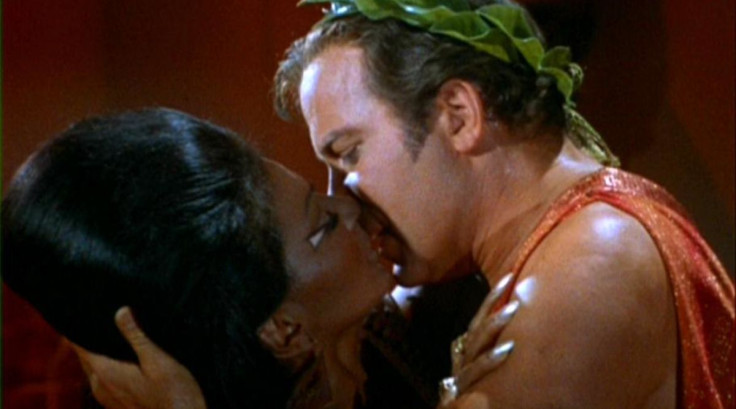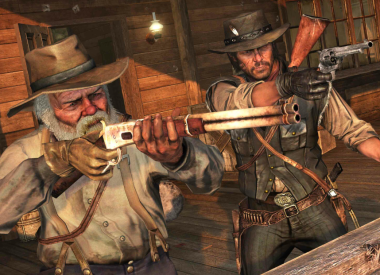On Thursday, the creators of Star Trek Beyond revealed Starfleet officer Hikaru Sulu (John Cho) would be in a same-sex relationship and have a daughter in the film. The character decision was apparently made in tribute to George Takei, the first actor to portray Sulu in the original Star Trek and a prominent LGBT rights activist.
But it soon came out that Takei objects to the tribute. "I’m delighted that there’s a gay character," he told The Hollywood Reporter. "Unfortunately, it’s a twisting of Gene’s creation, to which he put in so much thought. I think it’s really unfortunate."
Instead Takei would have preferred a new gay character. “Be imaginative and create a character who has a history of being gay, rather than Sulu, who had been straight all this time, suddenly being revealed as being closeted,” Takei told Entertainment Weekly.
Simon Pegg, who co-wrote the Star Trek Beyond script (with Doug Jung) and will appear as Montgomery “Scotty” Scott in the movie, responded at length, saying he “must respectfully disagree with” Takei.
Here’s a portion of his response, released to The Guardian:
“He’s right, it is unfortunate, it’s unfortunate that the screen version of the most inclusive, tolerant universe in science fiction hasn’t featured an LGBT character until now. We could have introduced a new gay character, but he or she would have been primarily defined by their sexuality, seen as the ‘gay character’, rather than simply for who they are, and isn’t that tokenism?
"Justin Lin, Doug Jung and I loved the idea of it being someone we already knew because the audience have a pre-existing opinion of that character as a human being, unaffected by any prejudice. Their sexual orientation is just one of many personal aspects, not the defining characteristic. Also, the audience would infer that there has been an LGBT presence in the Trek Universe from the beginning (at least in the Kelvin timeline), that a gay hero isn’t something new or strange. It’s also important to note that at no point do we suggest that our Sulu was ever closeted, why would he need to be? It’s just hasn’t come up before.”
The ongoing debate speaks to the nuance and complexity of how diversity discussions unfold in our popular culture. That Takei objected to the portrayal, and the production still insisted that the move was a tribute to him, is as clear an example as we’re likely to see of a diversity initiative flattening individual nuance under a presumed progressive consensus. It’s hard not to see the insinuation that Takei, as a gay man, could not have been portraying a straight man all those years, as the decision retroactively shoves Sulu in the closet. The Hollywood Reporter offers a good timeline of how the production ignored Takei’s objections before leaning on his LGBT activist reputation in trumpeting the “not a big deal” decision to make Sulu gay.
Contrasting Takei’s specific objections, the response on social media and among the film press has been overwhelmingly positive. Takei and Sulu are not the same person, so while Takei may object to the way in which the character realignment goes against Roddenberry’s original vision, the creation of a new gay role model in mainstream cinema could outweigh those objections, if increasing LGBT acceptance is the central ethical objective of the decision.
At this point it would be useful to look back at another landmark in Star Trek’s progressive political history: television’s first interracial kiss between James T. Kirk (William Shatner) and Nyota Uhura (Nichelle Nichols). The moment has been repeatedly cited by outlets describing Star Trek Beyond’s Sulu reveal. Pegg even mentioned it in his response, writing “Trek rightly gets a lot of love for featuring the first interracial kiss on US television.”
It’s always that one sentence, a variation on “Star Trek broke new ground in depicting the first interracial kiss broadcast on US television.” But that obscures the complications and compromises of the moment itself — both how it played out for audiences watching the Star Trek episode “Plato’s Stepchildren” and how it was originally shot.
Here is that kiss:
One aspect should be immediately obvious: it is far from consensual. In “Plato’s Stepchildren” the Enterprise crew beams down to a planet in response to a distress call. The distress call is a trap laid by the Greek-garbed Platonians who mainly want to use their telekinetic powers to puppet the crew for their own sadistic pleasure. First nurse Christine Chapel and Spock are forced to kiss, fighting it all the way.
Then Uhura and Kirk are forced to do the same. “I’m so frightened, Captain. I’m so very frightened,” Uhura says.
“That’s the way they want you to feel. It makes them think that they’re alive,” Kirk responds, urging her to lean into the moment and deny the Platonians the pleasure of tormenting them.
“I’m thinking of all the times on the Enterprise when I was scared to death and I would see you so busy at your commands. And I would hear your voice from all parts of the ship and my fears would fade. And now they are making me tremble. But I’m not afraid. I am not afraid,” Uhura says.
Then they kiss, Kirk looking up and straight into the eyes of Philana — the most sympathetic of the alien captors — the entire time.
It’s not exactly a romantic moment or a romantic kiss; it is deeply uncomfortable. Since NBC, the station that broadcasted Star Trek, had objected earlier that same year to a white woman touching a black man’s arm, it’s easy to see why the writers would have avoided any hint of romance.
Still, even this forced and uncomfortable moment very nearly didn’t make it to air. As Nichols describes, the episode’s director, David Alexander, seemed utterly unaware of what he was about to film. She recalls him cutting mid-kiss to discuss it with Shatner, while pointedly ignoring her.
“The director — who I knew and had a great deal of respect for, very fine director — said, ‘Bill!’ And he walks over, like I’m not sitting there with Bill Shatner, Captain Kirk, like I’m not there, and he starts talking to him like, ‘You, uh, kissed her.’ And Bill says, ‘Yes, yes I kissed her. Isn’t that what the scene is about.’ And he starts talking out of the side of his mouth like I’m not there.”
Shatner, burnishing both his progressive credit and ladies’ man reputation, argued for the scene with the director, saying, “She won’t let me kiss her offstage!”
They wound up attempting the kiss six times, with the director looking for more discreet ways to handle the moment and pushing the actors to act more and more horrified at what’s about to happen to them.
Under the watchful eyes of NBC “suits” they then tried the scene several times without a kiss, each take rendered unusable by Nichols and Shatner intentionally overacting. In her memoir, Beyond Uhura: Star Trek and Other Memories, Nichols describes the cast and crew watching the footage for the first time, writing, “When the non-kissing scene came on, everyone in the room cracked up. The last shot, which looked okay on the set, actually had Bill wildly crossing his eyes. It was so corny and just plain bad it was unusable.”
Even filtered through layers of compromise and prejudice, “Plato’s Stepchildren” didn’t air on several Southern affiliates, resulting in the series’ lowest rating ever. While Star Trek was already approaching cancellation, “Plato’s Stepchildren” certainly didn’t help.
Many of the critiques of Sulu’s gay retcon, Takei’s included, have a great deal of merit. An Annenberg report across TV and movies have found a pervasive and shameful lack of diversity in terms of gender, sexual orientation and race. Only about 18 percent of casts have as many women as men, resulting in only 33 percent of speaking roles going to women. Racial diversity continues to be a problem as well, with 18 percent of movies and 23 percent of narrative cable shows without even a single black character (it’s even worse for Asian characters at 50 percent and 51 percent respectively). Of 11,194 speaking characters surveyed, only 231 were LGBT, less than half of their demographic representation in American society.
The extent of the inequality suggests Pegg’s concern with “tokenism” will never be fixed by the trend of altering existing beloved characters alone. The diversity problem is so vast that reimagining Iron Man and Kick-Ass as black girls, Thor as a woman and Sulu as a homosexual can’t be the extent of the mainstream diversity arsenal. Star Trek needs new gay characters, too.
The Annenberg study makes it clear that altering the underlying makeup of the creative class needs to be part of the solution. While on-screen diversity is lacking, the problem is even more acute behind-the-scenes, where women make up only one-tenth of screenwriters and nearly 90 percent of directors are white.
As socialist commentator Freddie deBoer argues, making Sulu gay is partially just good marketing, covering up institutional diversity problems in the structure of Hollywood studios with populist pandering — offering minority groups cosmetic diversity as the corrupt foundation goes unchanged and unchallenged.
But even as we consider better pathways and more promising solutions, it’s hard to deny the simple, galvanizing power of a newly gay character, however compromised. Everything about the first kiss between a black woman and a white man on US television was uncomfortable and far from ideal, yet it still serves us today as a mile marker on a long road, something worth remembering as we discuss this latest imperfect move. Could it really be the case that the world is worse for this latest imperfect diversifying?
YEAH SULU IS ASIAN!!! A GAY POC IN ONE OF THE BIGGEST FRANCHISES EVER IM ACTUALLY CRYING
— moved! @sheithlings (@droidlings) July 7, 2016
? salemnevada: Ahhh!!! I’m so happy that Sulu is gay for the new movie !!! I immediately imagined sulu... https://t.co/oFfRdGWfgM
— Sʜɪɹoʞnᴍᴀ (@HikichiRyouk) July 8, 2016
While the kiss between Uhura and Kirk has become little more than one-sentence trivia in an ongoing struggle for racial equality, its distant twinkling is a good reminder of time’s flattening influence. Even compromised moments of progress can resonate decades later.
Sulu’s homosexuality is less radical in this era than Uhura’s kiss was in 1968 — “About time!” has been one of the more common reactions — but first steps are often uncertain and later than we’d like them to be. Hopefully, as with 1968’s sadly compromised kiss, taking this step will prove better than the alternative: leaving future generations with only our mainstream media’s deafening silence in the face of prejudice.


















